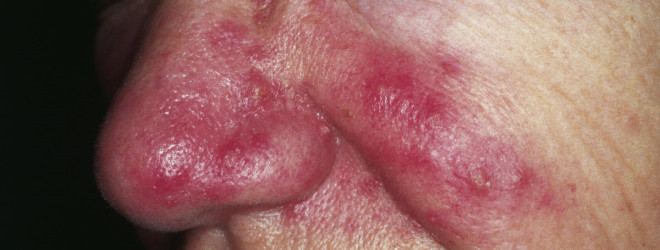Rosacea is a common skin disorder that manifests as a red spotty rash typically found on the face, including the forehead, chin, nose and cheeks, but can also affect other regions of the body such as the eyes, chest and back. Sometimes referred to as the "adult acne", rosacea is more common during middle age and is three times more likely to affect women. Although a specific cause has not yet been elucidated, rosacea has been linked to a variety of factors including chronic infection, poor digestion, improper diet, medication side-effects, and lifestyle factors. Chronic cases of rosacea often manifest as small bumps and pustules along with a generalized increase in local redness, often accompanied by red eyes, as well as burning or stinging sensations. If left untreated, chronic rosacea can lead to telangiectasia (dilation of superficial blood vessels on the face) as well as rhinophyma, in which the nose gradually becomes bulbous and red from chronic inflammation. There is also … [Read more...]

Q&A: Is flax oil good for health?
With all of the hype on flax seeds could you please explain your recommendations on flax seeds and flax oil?! The consumption of flax seed and flax oil was popularized during the early 1990s in response to scientific research suggesting that the chronic inflammation that characterizes Western civilization was caused by an imbalance between the ratio two different types of "essential" fatty acids, popularly known as "omega 6" and "omega 3". The research showed that Westerners consumed too much omega six fatty acids, primarily, from recently introduced industrial fats such as corn oil, safflower oil and soya oil. As these new fats displaced traditional saturated fats such as butter, lard and tallow, the ratio of omega 6 fatty acids relative to omega 3s in the Western diet increased dramatically. The body uses omega six fatty acids to promote inflammation, and omega 3 fatty acids are metabolized to reduce or inhibit inflammation. Inflammation is a very useful and life-saving mechanism, … [Read more...]

How to treat dandruff?
Dandruff is a hyper-proliferative affliction of the skin of the scalp, meaning that for some reason the skin has a rapid rate of turnover and flakes off in excessive amounts. Although emboldened with it's own scientific name (Pityriasis simplex capillitii, complete with no less than eleven syllables and a double 'ii' thrown in for good measure), the term 'dandruff' is really more of a wastebasket diagnosis, meaning that any number of factors can cause it. But even if they don't fess up directly, those dandruff shampoo manufacturers are betting that it's caused by a fungal infection. Just go take a look at your bottle of anti-dandruff shampoo. Ketoconazole? Selenium sulfide? Zinc pyrithione? All anti-fungals. Hmm. Could it be that everyone's dandruff is caused by a fungal infection? But why on earth would so many people have this problem? Shampoo is derived from the Indian word 'champu', referring to a head massage. Although most of us have a bottle of it in the shower, it was only a … [Read more...]

Q&A: Menstrual cramping
I have really bad cramping during my menstrual cycle, what can I take? Also, is this affecting the fact that I'm trying to get pregnant? Excessive cramping during menses (dysmenorrhea) can be related to many factors, and without seeing you it is difficult to say which are at play. However, there are a few basic categories of issues that I see in my patients with dysmenorrhea. Inflammation The first issue relates to an imbalance in eicosanoid production, locally acting hormones such as prostaglandins, thromboxanes and leukotrienes that mediate the pain and inflammation of dysmenorrhea. Cleaved from the fatty acids in the membranes of our cells, this imbalance in eicosanoid production is mostlycaused by consuming too many omega 6 fatty acids relative to omega 3s. In an attempt to maintain the yin-yang balance of homeostasis, the body utilizes omega 6 fatty acids to create pro-inflammatory eicosanoids, whereas omega 3 fatty acids are metabolized to produce anti-inflammatory … [Read more...]

Original “fire cider” for nausea
A few weeks ago I had a visit from a family who brought their senior-aged mother to see me, complaining of a relentless nausea. No cause could be ascertained, and she had already spent a couple days in the hospital on IV, but with no respite. When I examined her, the poor lady was very pale and cold, barely coherent, and was listing in her chair, almost falling over. Her family was obviously very worried, but I was confident that I could restore her rather quickly, my optimism based on a little remedy I discovered about 15 years ago. While she and her family waited, I excused myself and made some up. I measured out a dose and diluted it in warm water, gave it to the mother, and then continued talking to the family about ways they could restore her electrolytes and digestion. Within a minute or so, the mother's pallor changed notably, and she began to sit upright, and answer questions easily. Her eyes were clearer and brighter, and by the time she left a few minutes later, she easily … [Read more...]






